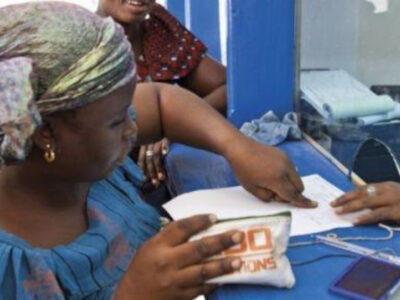
This article is sponsored by Vista Bank Group
Beyond the business matrix of running a successful banking group, what would you say are overriding objectives of Vista Bank?
The Vista Group’s main objective is to contribute to economic and financial inclusion in Africa through its subsidiaries and branches, and it prides itself on providing a full range of innovative and accessible banking services to everyone, especially women and ws, to generate economic growth and prosperity in its countries of operation.
Following the acquisition of some Société Générale subsidiaries and Orabank, the Group will have a presence in 16 West and Central African countries.
With a multi-channel approach straddling digital, branch, agency and ATM services, Vista’s focus is on the mass-market retail, SME and corporate markets.
For businesses, we provide trade finance, supply chain finance, meso-finance, leasing, factoring, bancassurance, women’s business banking and advisory services including training, insurance and support services.
There has been a long-standing spotlight on the constraints to SMEs’ growth and business opportunities caused by their lack of access to finance. Vista is addressing this through strategic partnerships with global financial institutions, through which we establish sizeable lines of credit.
With this approach, Vista is making a real difference to business activity, enabling faster development, diversification and growth for SMEs. It also has a multiplier effect on commercial activity and will play an increasing role in building the continent’s national economies with sustainable growth.
Finally, you will soon see the launch of a youth package. Africa is the continent with the highest proportion of young people in the world – 60% are under 25 – but in our countries, young people are also the least well served in terms of banking services.
Vista Bank will soon deploy a programme dedicated to young people, to ensure training and support for their professional integration, in addition to a revised banking offer for them.
Young people represent the future of the African continent and Vista will be at their side.
At Vista, our ethos is heavily grounded in our core values of service, integrity, innovation, excellence, respect, performance, governance and accountability.
In terms of the wider socio-economic environment you are situated in, what shapes your corporate responsibility framework?
We are committed to corporate social responsibility initiatives that positively impact the socio-economic development of the relevant communities in which we operate.
We believe in acting ethically, honestly and with integrity. It is ingrained in all we do as an organisation and how we interact with our customers. This belief and commitment expands to how we do business and how we approach working with other businesses.
There are several examples I can give you. (Please see box, below.)
As a financial institution serving a wide range of industries and customers, we are in a unique position to drive economic development in our communities,
while also holding ourselves and our customers to a high standard of business ethics.
We believe in the importance of treating each other with respect and fairness, and we work to make positive change in our communities. When they succeed, we succeed.
As a pan-African group, our corporate responsibility is evidenced by all the commitments of our affiliates, acting as the operational and efficient factors.
Whether this relates to the financing of developmental projects or to community-based actions geared to promote financial inclusion, the Group, in its African dimension, has managed to position itself as a key player, highly involved in the economic, social and environmental development of the many countries where we are doing business.
SMEs – including women-run businesses – are the backbone of most economies but are sadly neglected in Africa. What are you doing to reverse this?
SMEs, as you say, are the DNA of our economies. They represent 80% of the economic fabric. Since its inception, Vista Bank, through its vision and mission, has supported African SMEs, women and youth – real stakeholders in the value chain of African economic development.
The expansion of the Group will allow us to support them in the different countries in which we will operate. The driving force behind women’s entrepreneurship cannot be ignored in our African economies. Women entrepreneurs bring a new perspective, boundless creativity and an inspiring vision.
The Proparco-Vista Bank Group partnership will add strength to a favourable ecosystem for them to succeed and take advantage of growth opportunities.
Women are very present in entrepreneurship in Africa, this is an observation that anyone who sets foot on Guinean, Burkinabé, Gambian or Sierra Leonean soil could confirm, in particular by going around the markets.
Unfortunately, they are not very visible in economic statistics, even though they represent 49% of the working population, because they operate in the informal sector and some of them are illiterate. Women entrepreneurs work mainly in the trade sector, the agricultural sector, sewing, saponification (making soap), and trade in local products.
The Vista Bank Group is aware of the many challenges faced by SMEs, particularly women entrepreneurs. This is why, for example in Guinea, a specific offer for women entrepreneurs is part of the bank’s strategic plan, supported by our partners Enabel and Proparco.
In Guinea we have launched an offer that not only meets the needs of women entrepreneurs, but also tailors support to reduce some of the risk factors, for example the lack of a long-term strategy.
Our package includes end-to-end support, with the backing of partner institutions. This involves a lot of activities such as supporting a public-private partners for the formalisation of women’s enterprises in Guinea.
We also help with opening bank accounts on exceptional terms for the first two years; easier conditions of access to finance adapted to their activity, with advantageous rates for the first two years; training with our institutional partners in the implementation of strategic business plans; training in micro-management, accounting, HR management, marketing, packaging, distribution, digital communication and so on.
We also provide local support and financial management advice, support with approved management centres for the preparation of financial statements; connections through the banking store concept and the bank’s social networks; and grants as part of our corporate social responsibility strategy. Vista Bank and Cybastion have also allocated CFA100m to DigiFemmes, a social impact programme in Côte d’Ivoire.
Investing in women’s empowerment is the surest path to reducing inequality, eradicating poverty and achieving inclusive economic growth.
With this partnership, the Vista Group intends to strengthen women’s skills and ultimately create opportunities, thus fostering a positive impact in society.
You are also tackling one of the most pressing issues in Africa today, the need for affordable social housing. What is your programme in this regard?
In 2022, as part of the partnership of our subsidiary Vista Gui with AGUIFIL, a social housing project was born in the Tannerie district of the capital, Conakry.
The accommodation provided is a real opportunity for the Guinean population to become home owners and Vista is committed to promoting home ownership for its clients.
On 26 October 2023, Vista Bank Guinea, a local subsidiary of the financial and banking group Vista Group Holdings, signed a $12m loan agreement with Shelter Africa Development Bank.
This line of credit, guaranteed by the parent company of Vista Bank Guinea, will be made available to small and medium-sized enterprises (SMEs) and entrepreneurs operating in the housing, construction and renovation sector in Guinea. The aim is to support the housing value chain in the country.
This agreement with Vista Bank Guinea follows the signing of a memorandum of understanding between the Guinean government and the Shelter Africa Development Bank on 25 October.
The agreement between the two institutions is concerned with the implementation of housing projects in the country.
Shelter Bank is committed to advising and providing technical assistance to the government of Guinea to develop a strategic plan to address the housing gap in Guinea.










Comments